Taiwan Tech students win three major awards at Makerthon, innovating with green energy, environmental protection, and technology integration.
In this year's Ministry of Education Skills Competition Makerthon, Taiwan Tech students shone brightly. Students combined green energy, environmental protection and other social issues closely related to people's livelihood to create “Clean Energy Garbage Truck”, “Physical Solar Efficiency Simulation System with Citizen Power Plant Integration Platform” and “Solar-Powered Garbage Recycling Truck”. These solutions won the top prizes, Best Technology Award, and Best Creativity Award, showcasing their innovative thinking and problem-solving abilities.
Among them, “Clean Energy Garbage Truck” by Tung-Hsuan Hsu from the Department of Industrial Management, Chung-Hao Shih from the Department of Mechanical Engineering, and Hsung-Fei Chen from National Taipei University of Technology converts heat energy generated by burning waste into electricity to power an electric garbage truck. Equipped with an LED screen and a mobile app, the truck promotes green energy knowledge and interacts with residents who take out the garbage. Users can earn green points through online quizzes, redeemable for special garbage bags and essential items, enhancing public awareness and participation in sustainability initiatives.
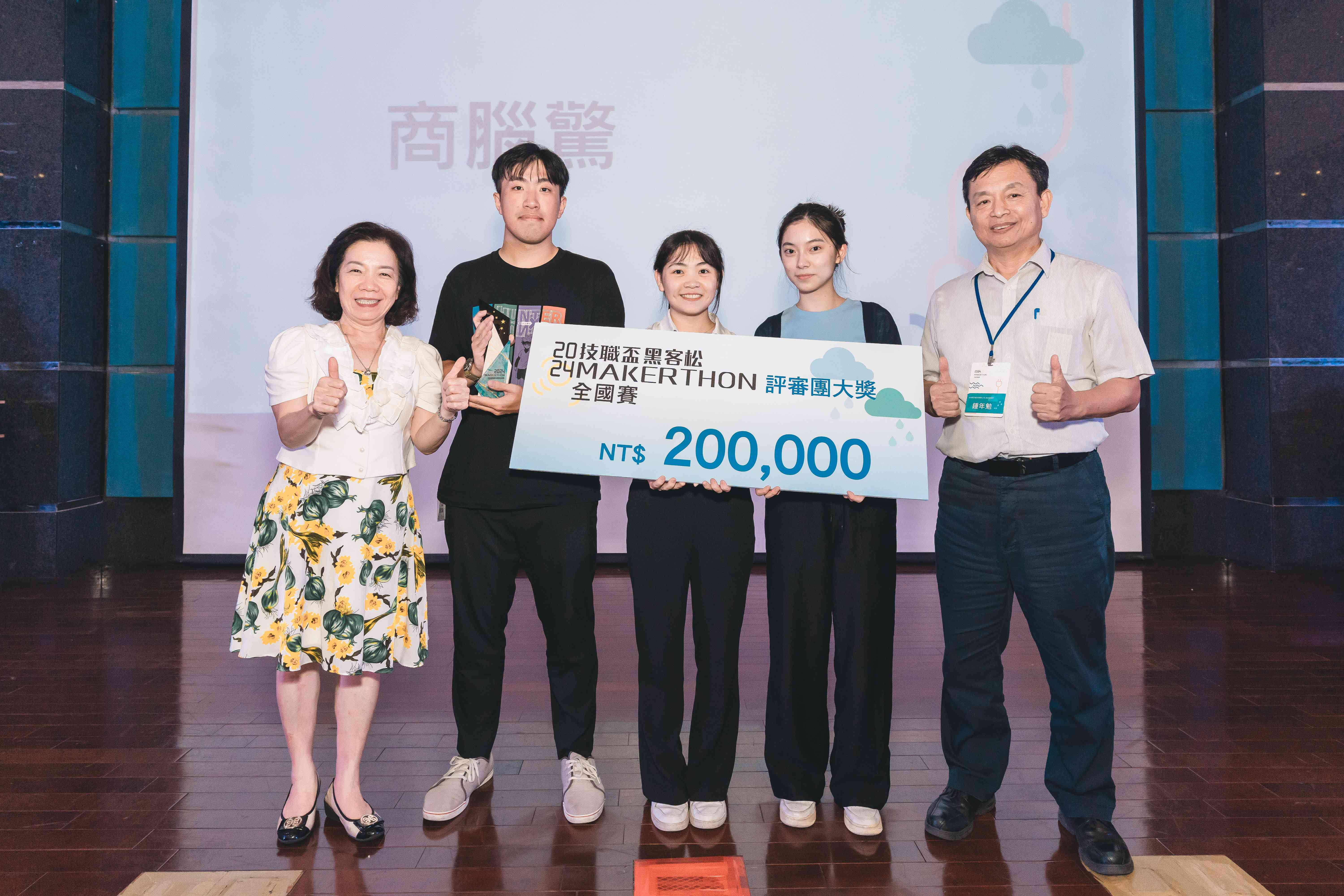
The project “Clean Energy Garbage Truck” by Tung-Hsuan Hsu (second from right) from the Department of Industrial Management, Chung-Hao Shih (second from left) from the Department of Mechanical Engineering, and Hsung-Fei Chen (third from right) from National Taipei University of Technology won the Grand Prize from the judges at the Skills Competition Makerthon.
Winning this award came as a pleasant surprise and great joy to them. Chung-Hao Shih, currently pursuing his second year of Master's in the Department of Mechanical Engineering, mentioned he thinks more in a standard way. However, he acknowledged his teammates’ innovative ideas that pushed boundaries, so his role was to refine and distill the best concepts through three to four plans before finalizing the “Clean Energy Garbage Truck” idea. Team leader Tung-Hsuan Hsu pointed out that while Taiwan already has electric garbage trucks developed by local manufacturers, widespread replacement of conventional fuel trucks isn't yet necessary. She believes achieving full electrification of garbage trucks may be challenging in the short term but sees it as an inevitable trend for the future.
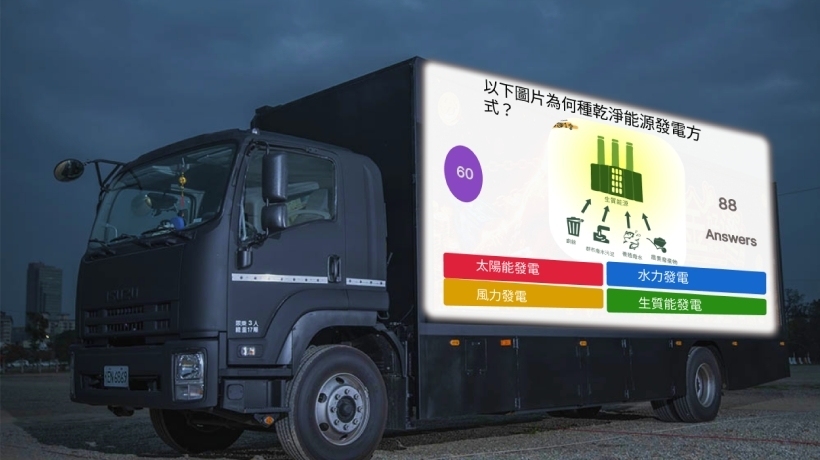
The “Clean Energy Garbage Truck” enhances public engagement in sustainability issues by featuring an LED screen for interactive education with citizens. It also allows people to accumulate points through online quizzes, redeemable for goods, thereby boosting public willingness to participate in sustainable initiatives.
Incorporating green energy generation with Taiwan's tight electricity supply issues, Ming-Zhe Ho, Hsiang-Hung Shih, and Hsin-Hua Wang from the Department of Computer Science and Information Engineering developed the “Physical Solar Efficiency Simulation System and Citizen Power Plant Integration Platform” winning the Best Technology Award. They aim to enable community members to assemble house models and install solar panels, calculating power generation capacity and returns through the system to enhance understanding among residents and children about solar panel installation. For those interested in installing solar panels at home, the Citizen Power Plant Integration Platform can reduce the complex matching process, increase the matching opportunities between roof renters and solar panel investors, and accelerate the adoption of clean energy in communities.
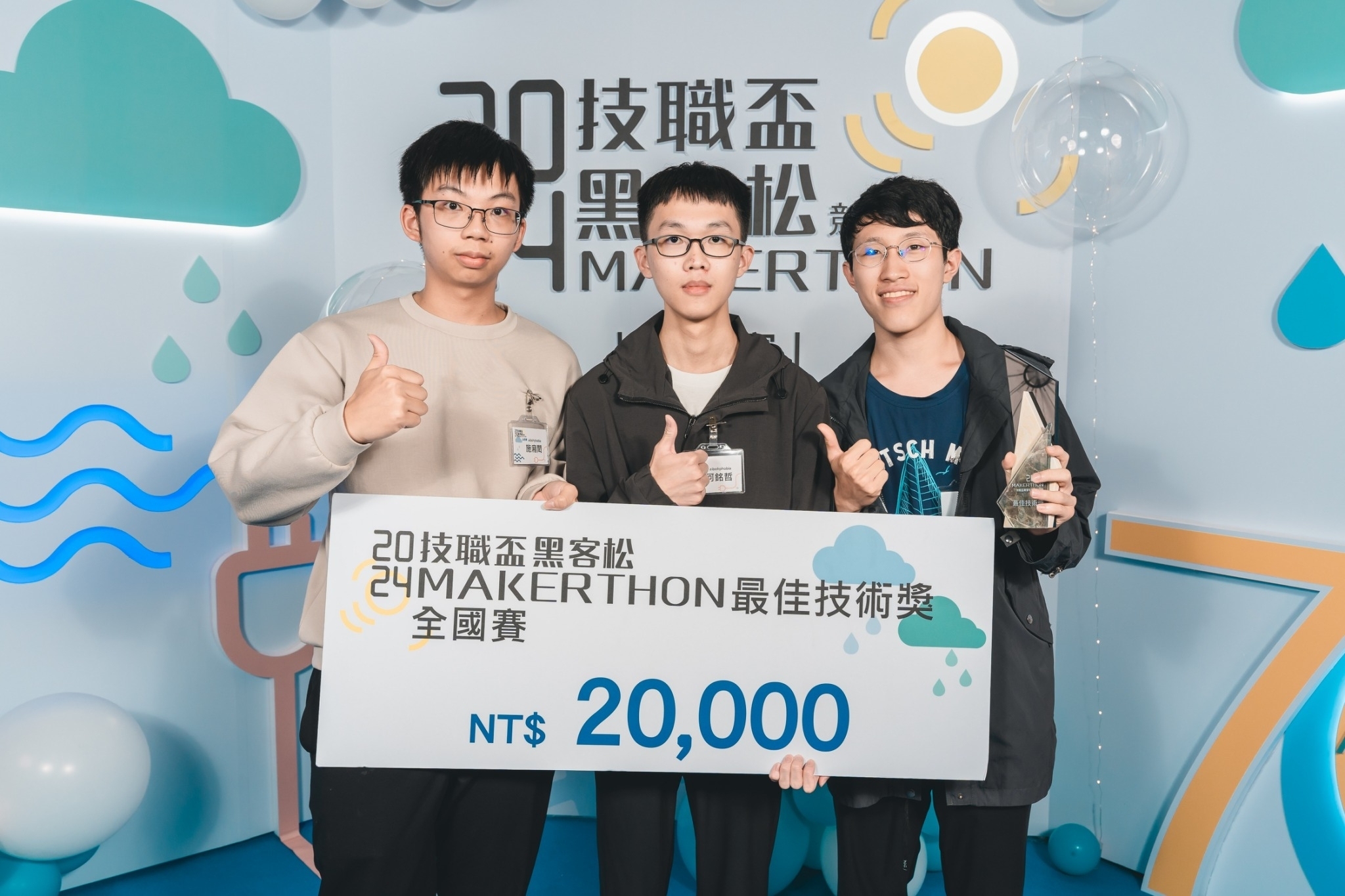
Ming-Zhe Ho (middle), Hsiang-Hung Shih (left), and Hsin-Hua Wang (right) from the Department of Computer Science and Information Engineering developed the “Physical Solar Efficiency Simulation System and Citizen Power Plant Integration Platform” winning the Best Technology Award.
Ming-Zhe Ho shared that because the competition time was very close to the final exams, they initially considered withdrawing. Despite the pressure from their studies and the competition, they persevered and successfully completed the project. Reflecting on their experience, the team members realized that their abilities were better than they had imagined, boosting their confidence. They expressed gratitude to their teachers for their daily guidance and the high standards of technical expertise demanded, which enabled them to fully demonstrate their project through reports and practical implementation.
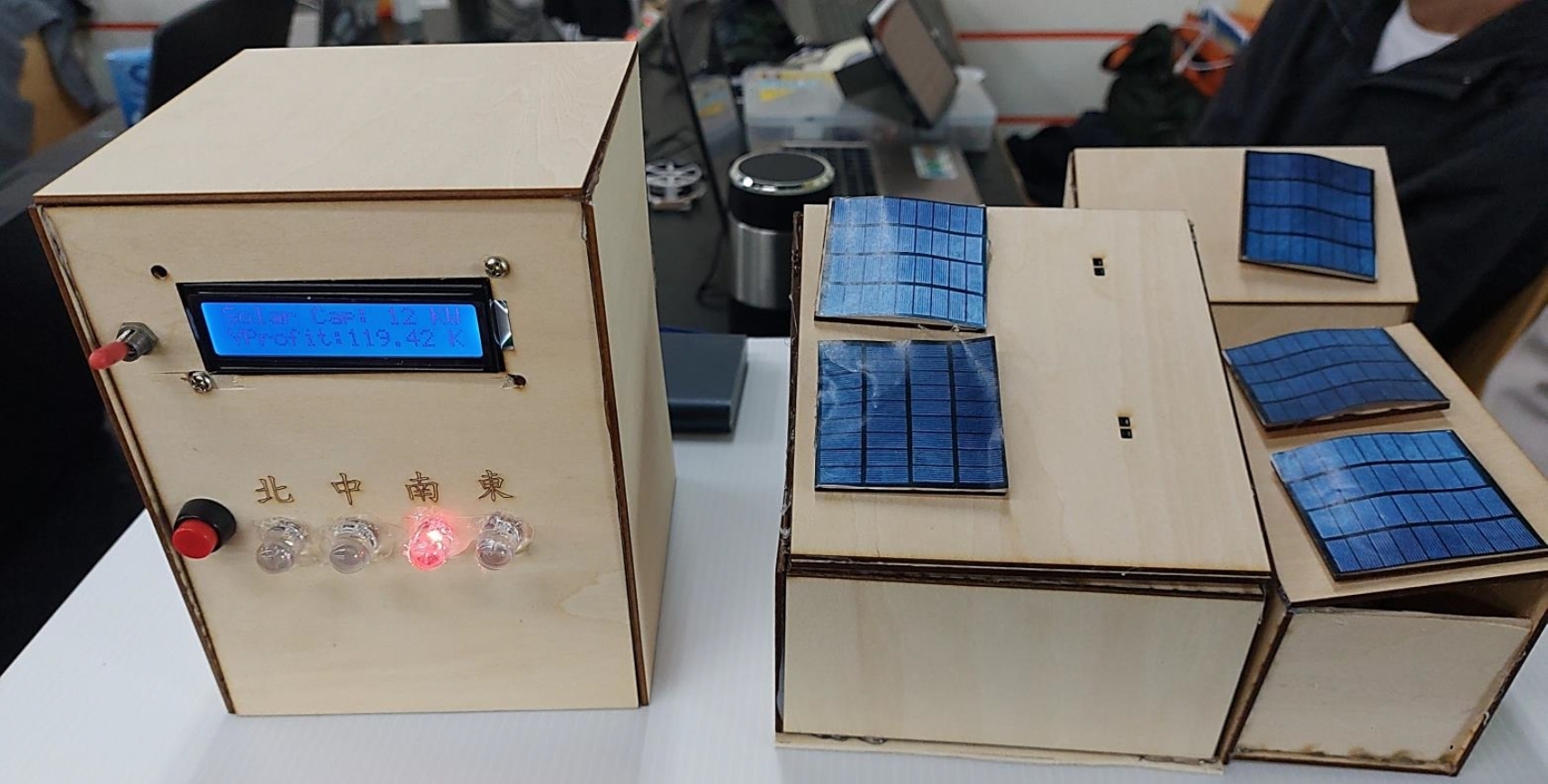
The “Physical Solar Efficiency Simulation System and Citizen Power Plant Integration Platform” dynamically calculates power generation capacity and returns based on the combination of housing and solar module installations.
Winning the Best Creativity Award, the “Solar-powered Garbage Recycling Truck” impressed with its unique and practical design. This vehicle integrates solar panels, visual recognition, grabbing mechanisms, Bluetooth remote control and other technologies, enabling it to autonomously cruise, detect, and collect trash on beaches. Rui-Ming Yao and Dong-Yan Zhuang from the Department of Computer Science and Information Engineering, along with Ding-Xu Wu from the Department of Electrical Engineering, all sophomores, participated in the Skills Competition Makerthon for the second time. Ding-Xu Wu mentioned their approach of combining remote-controlled vehicles with grabbing claws aims to allow children to play and clean the beach simultaneously, achieving both educational and recreational goals.
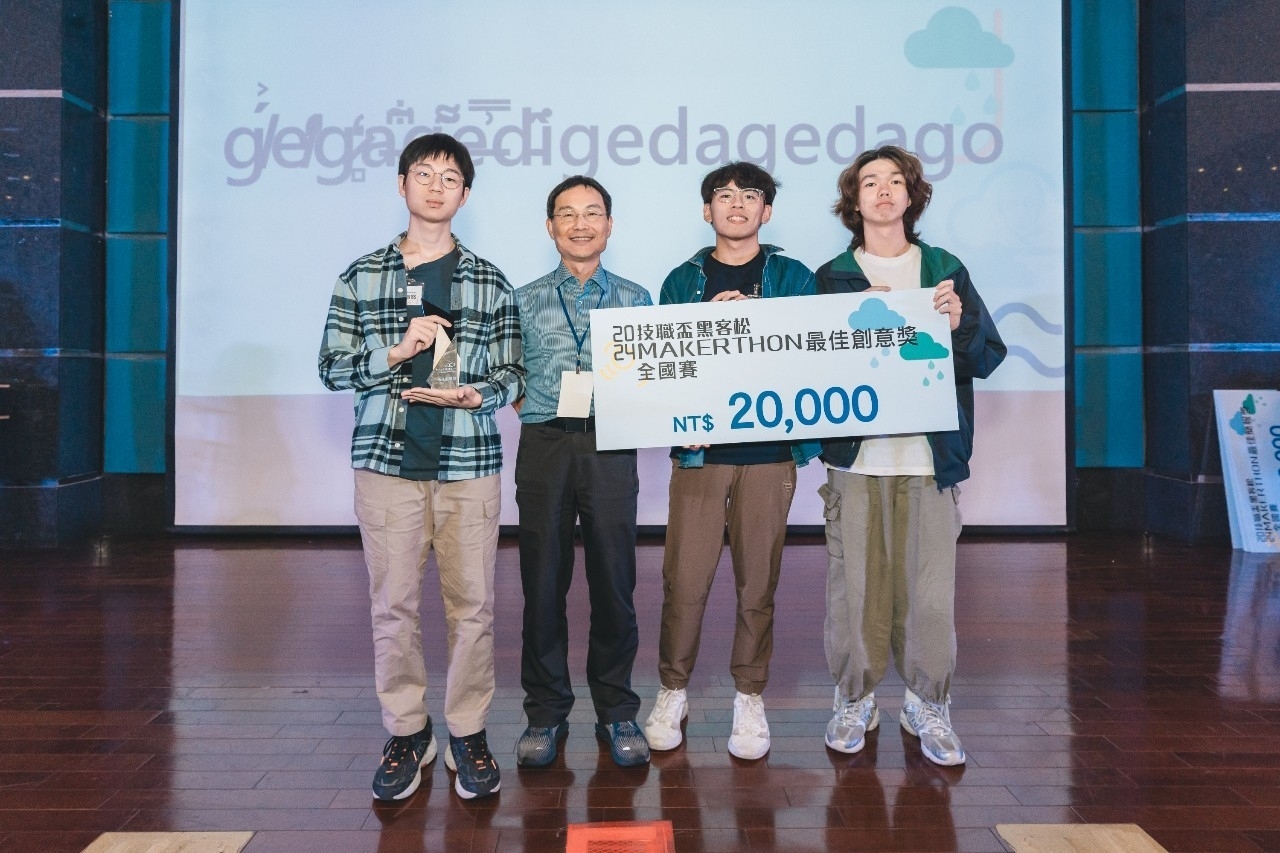
Rui-Ming Yao (first from left), Dong-Yan Zhuang (first from right), from the Department of Computer Science and Information Engineering, and Ding-Xu Wu (second from right) from the Department of Electrical Engineering created the “Solar-powered Garbage Recycling Truck”, winning the Best Creativity Award.
Rui-Ming Yao, Dong-Yan Zhuang, and Ding-Xu Wu all aspire for the “Solar-powered Garbage Recycling Truck” to transcend the concept and become a practical reality in the future, realizing its full potential. They are deeply passionate about challenging themselves and fostering creativity. “Seeing our performance, many students are interested in participating next year”, they noted, hoping to attract more participants to collaborate and compete together. They aim to use competitions as a platform to test their skills, gain valuable experience, and continue improving themselves.
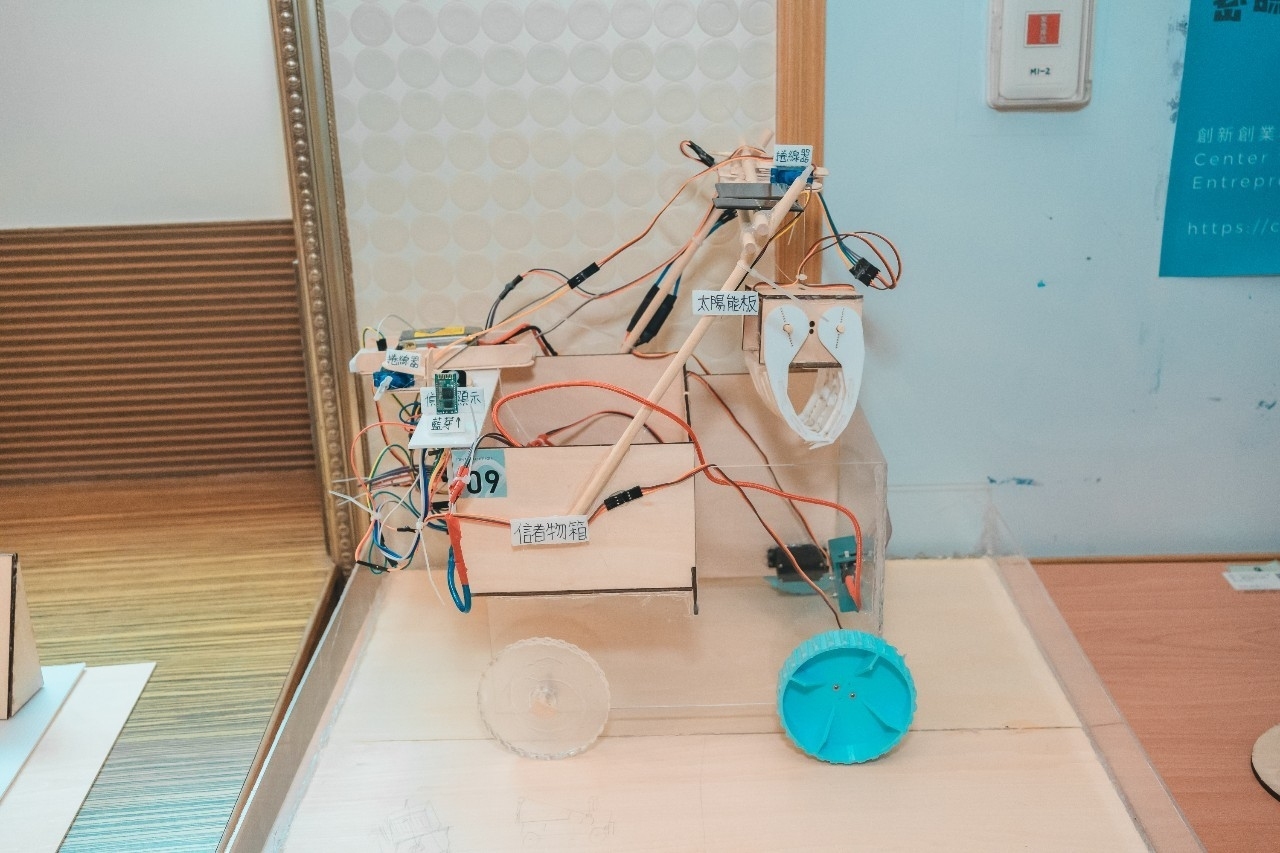
The “Solar-powered Garbage Recycling Truck” integrates solar panels, visual recognition, grabbing mechanisms, and Bluetooth remote control, allowing children to play while cleaning beaches, and achieving educational and recreational purposes.
Students provide valuable insights and contributions for future green energy and environmental conservation issues, showcasing the younger generation's commitment to social responsibility and sustainable development. Taiwan Tech will continue to promote innovative education, encouraging students to learn through practice and cultivate innovative thinking and problem-solving skills.
